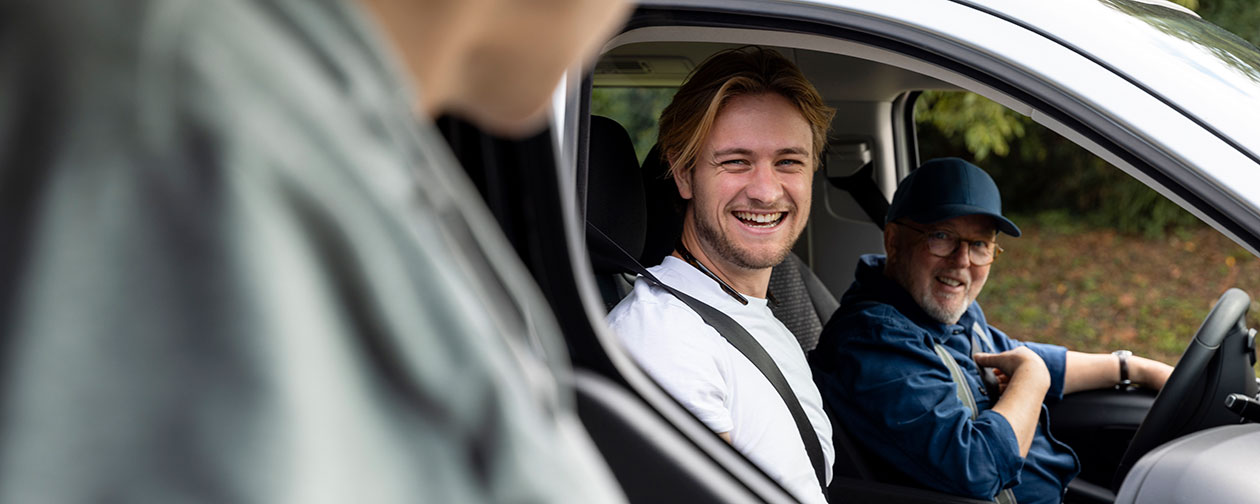
Top tips for safe driving
What are the top things you should know to be a safe driver? This helpful Tesco Bank guide walks you through all the handy tips and things to think about to be a safer driver, and reduce the risk of car insurance claims.
Published:30 November 2023
Better technology and safer cars can only be a good thing when it comes to preventing accidents, but it's still important to take as many precautions as possible to ensure a safe journey from A to B. Wherever you are driving to, and regardless of the length of the trip, protect yourself and your passengers with these safe driving tips.
Check your car before setting off
Always check that the tyre pressure is at the correct level before a long journey, including the spare wheel. If the tyre pressure is off, it could affect your braking and steering. You should check the tyre tread regularly, and it’s especially important to make sure it’s at the right level before you set out on a long journey. Spotting any problems before you leave could save you from having to change a tyre on the roadside, or suffer a fine and penalty points. Check all fluids, including oil, water and windscreen wash, and top up where necessary.
Break up the journey
Studies have shown that driving when tired can impair your judgement almost as much as drinking alcohol. Pull over to take a break every couple of hours, stretching your legs, grabbing a drink, or maybe taking a nap. Sharing the driving responsibilities with someone else will also ease the burden.
Prepare for all weathers
Different types of weather will bring their own safe driving tips, and you will need to adjust accordingly. In rain or fog it is important to slow down and also dip your headlights, turning on the fog lights if necessary. Refrain from overtaking, and instead keep a safe distance from the car in front. Use the brake and accelerator gently, and stay in the lower gears if you’re driving where ice affects the roads.
Watch for cyclists
Spotting motorcyclists or cyclists as they approach from behind at a junction can be difficult, so always be careful when turning, and check mirrors and blind spots thoroughly. If you overtake a cyclist, give them plenty of room and watch for signs that they may intend to pull out, such as looking over their shoulder. Also try to spot obstacles that may cause them to stop suddenly.
Choose where you park carefully
Don't give thieves an excuse to break into your car. If you're parking on the street, try to find a spot somewhere busy, near some shops or a hotel, or under a street lamp. A car with a neat interior, where the potential thief sees nothing but upholstery, is less likely to be broken into than one with towels or bags that appear to be hiding valuables.
Wear a seatbelt
According to UK law, you must wear a seatbelt if one is available. This applies to people in both the front and rear of the car. Some exemptions apply, such as for those with medical conditions or if driving a classic car without seatbelts, but in that case no children are allowed to sit in the front seat.
Don't use a mobile phone while driving
The consequences for being caught using a mobile phone while driving are a £100 fine and three penalty points. A hand-held phone must not be used at any time, even at traffic lights or in a queue, or if supervising a learner driver. Emergency 999 calls are the exception, while it’s also acceptable to use a hands free kit. Similar distractions such as eating behind the wheel, while not illegal, can still land you in trouble if they affect your driving.
Obey the speed limit
Do not exceed the speed limit for the type of road you are on, or for the circumstances you are driving under. For cars, the limit is 30mph in a built-up area, 60mph on a single carriageway, and 70mph on a dual carriageway or motorway. That may vary if you are towing a trailer or caravan. Some local councils may also impose their own speed limits, such as 20mph near a school.
Don't tailgate or hog the middle lane
Under new legislation, these actions can carry a £100 on-the-spot fine, with three points added to your driving licence. These offences are most likely to occur on the motorway, with driving too close to the vehicle in front or needlessly staying in the middle or outside lane now landing you in hot water with the police.